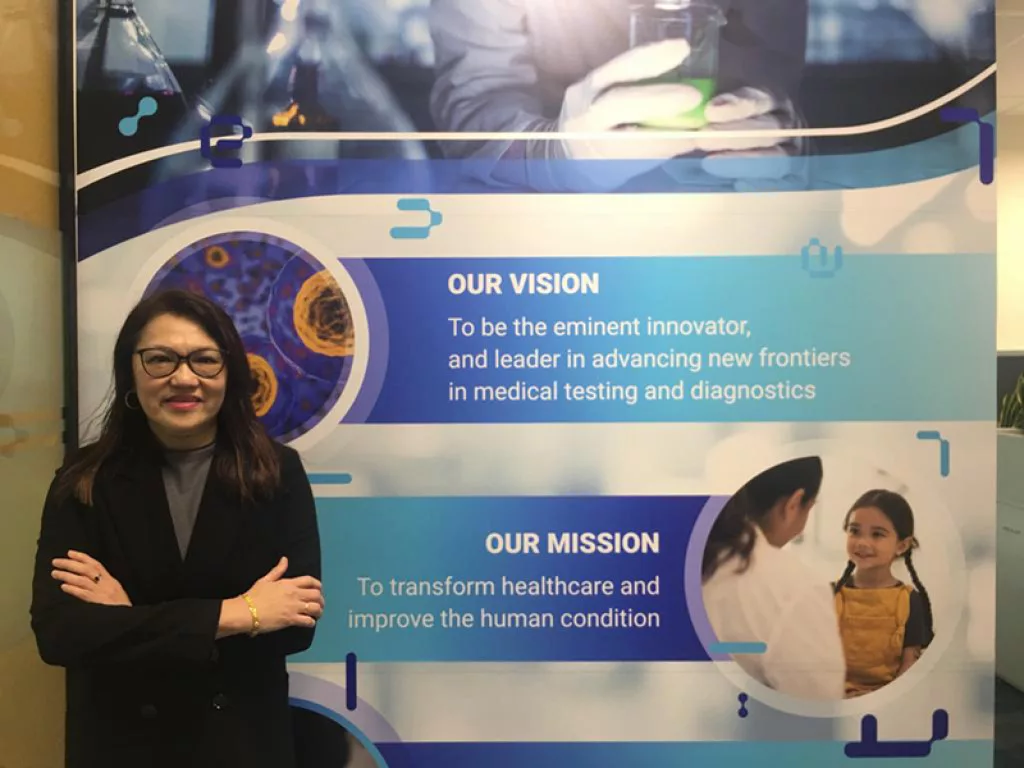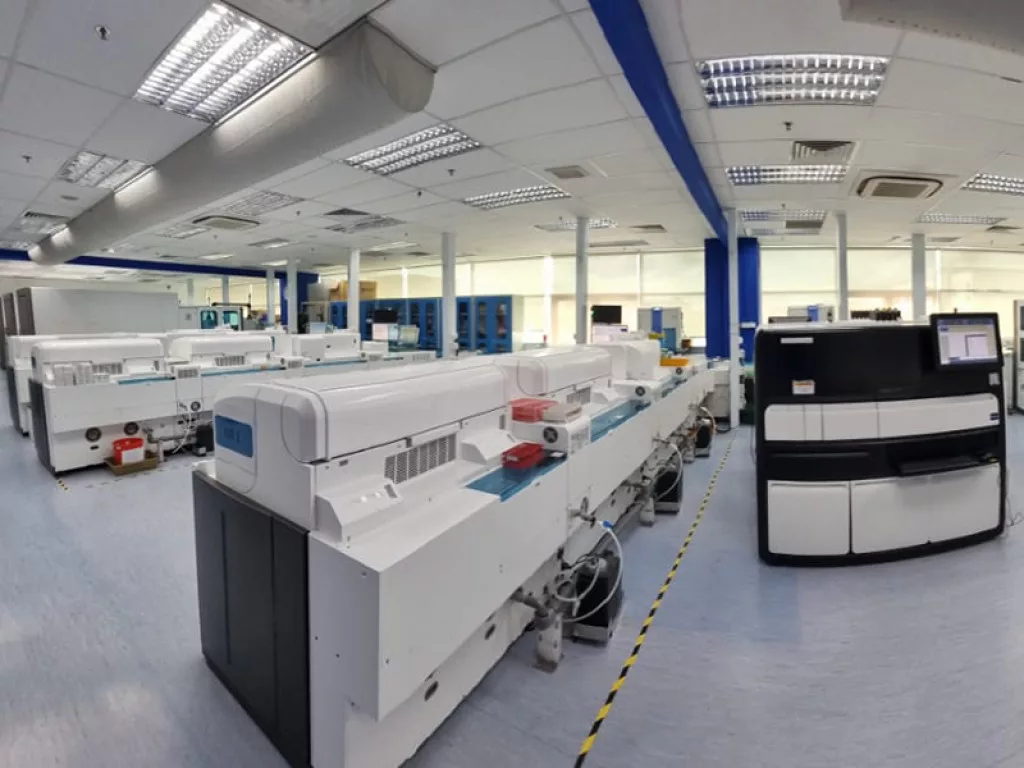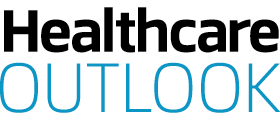Following a recent merger, Innoquest Diagnostics is moving forward as one in pursuit of transformative healthcare. Ginny Foo, CEO, gives us the details.
QUEST FOR HEALTH
“Whilst the medical diagnostics industry has always been robust and resilient, the COVID-19 pandemic saw a sea change in focus on diagnostics.”
At the forefront of this shifting dynamic is Innoquest Diagnostics (Innoquest), whose CEO, Ginny Foo, believes there has never been a more exciting time to be in the industry.
Innoquest was officially launched in March 2021 as a merger of Quest Laboratories (Quest) and Innovative Diagnostics (IDPL), both long-established in Singapore having been founded in 1995 and 1996, respectively.
Whilst the Innoquest brand is still in its infancy, the actual origins of the lab therefore go back more than 27 years.
“The merger between Quest and IDPL was complicated by the long history of the two labs, the multiple overlapping clients, clinics and test/profile codes, and the different laboratory information systems (LIS) and instrument platforms (LIP) used,” Foo informs us.
“The Innoquest team are truly unsung heroes who put in countless hours to build the lab that we see today. There were endless issues and hurdles that we needed to overcome to smoothen our workflow and streamline our processes; I also wish to thank our loyal clients who stuck with us throughout.”
Innoquest is proud to serve clinicians, hospitals, medical centres and their patients, as well as non-profit organisations, through the deployment of advanced diagnostic testing methods, supported by a wealth of industry expertise and ground-breaking technology.
Operating from seven facilities in Singapore, Innoquest’s main laboratory at Starhub Green is installed with the Roche total laboratory automation (TLA) system, capable of performing tests for more than 15,000 patients a day.
“What we achieved in 2021 was truly amazing. We managed to merge two huge laboratories into one, renovated and expanded the lab space so that we could change our LIP, upgraded our LIS to a newer version, and continued to improve our lab processes.”
With the installation of multiple Roche TLA systems at Innoquest’s laboratories, the company has been able to enhance the capacity, accuracy, and quality of its testing capabilities.
The patient’s sample is placed into the TLA system, which reads the barcode on the back of the sample tube and detects what tests to run. Once tested, the sample goes into refrigerated storage at the stockyard; if clinicians wish to add a test, the request is relayed to the LIS and the sample is automatically retrieved from the stockyard.
“For abnormal results, repeat criteria are keyed into the system. Samples that require a repeat are picked up automatically by the system and transported to the analyst, minimising human intervention and removing human error almost completely from the entire analytical process,” Foo explains.

COVID-19 RESPONSE
The company’s extensive network of laboratories offer a wide range of in-vitro diagnostic (IVD) tests across laboratory medicine, to help detect diseases or conditions and to monitor the health of patients.
“We provide a full range of IVD tests, which include allergy testing, biochemistry, anatomical pathology, haematology, immunology, microbiology, molecular and much more.
“100 percent of cancers are diagnosed by pathologists, and 70 percent of medical treatments, diagnoses and discharge decisions are based on pathology test results. Everyone from birth to old age uses pathology at some point in their lives to determine the status of their health – that is how important and crucial medical diagnostics are to the healthcare industry,” emphasises Foo.
At the peak of COVID-19 testing, Innoquest had about 300 members of staff in the COVID-19 labs and logistics department, providing a 24/7 round-the-clock service to clinics, hospitals, and swab collection sites.
“Our core business comprises over 440 employees, so altogether we had around 740 people working under the Innoquest brand by the end of 2021. Now, we are slowly ramping down the COVID-19 labs and redeploying some personnel to our other laboratories.”
In response to the urgent need to boost Singapore’s COVID-19 testing capacity, the company worked alongside the Ministry of Health to build five COVID-19 testing laboratories in 2020 within the space of nine weeks.
To date, more than 3.8 million COVID-19 swab tests have been performed by Innoquest, who had to quickly pivot to perform enough PCRs to cater to the mass testing requirements of the nation.
“The last two years have taught us many things in terms of hazard preparedness. Innoquest has stepped up to the challenge and contributed significantly to the nation’s COVID-19 testing capacity throughout the pandemic. After going through this exercise, we are now more prepared to face any such pandemics again in the future,” Foo acclaims.
As a result, Innoquest laboratories went from performing 200 molecular tests per day to several thousand at the height of the pandemic, and since April 2020 has issued over 10 million patient results.
Given the huge number of samples that have been processed, the pandemic has unsurprisingly been an extremely busy and stressful time for Innoquest.
“The mental and physical stress on our lab staff was enormous, as they had to ensure they did not get infected with COVID-19 and transmit the virus to their family members. Some staff were staying away from their family members for months whilst they were working in the laboratory, just to keep their families safe,” reveals Foo.
“Many staff stepped up from their usual job scope to help with the COVID-19 testing process, such as driving vans to pick up samples from collection sites or helping to sort out samples for testing at the labs.
“With the right processes in place, we are very glad that after two years of intense testing, no one at the lab has been infected,” she continues.


DIGITAL TRANSFORMATION
Innoquest recently automated its microbiology department, by investing in the latest MALDI-TOF mass spectrometry for the identification and diagnosis of microbes.
Prior to the MALDI-TOF system, it would take at least 72 hours for a clinician to receive indicative information on the result of the test. As microbiology is often a decisive factor in the prescription of antibiotics, this lengthy turnaround time ran the risk of increasing antibiotic usage.
With the MALDI-TOF system in place, Innoquest is able to provide a turnaround time of less than 48 hours and an overall accuracy of 95 percent at species level, enabling fast and correct treatments for patients.
“We hope this will assist Singapore in reducing the unnecessary use of antibiotics and improve antibiotic stewardship,” outlines Foo.
This automated system ties in with Innoquest’s ongoing digital transformation initiatives, as it embraces a world of electronic orders, e-billings, e-payments and digitalised reports. Not only does this enable patients and doctors to receive results quicker, but it will also enhance the overall patient journey and subsequently result in better care.
“We will no longer work in the background, but instead take on an enabling role in bringing quality care to patients in collaboration with our healthcare partners.”
Providing high quality, accessible, and affordable diagnostics is at the heart of Innoquest, and can’t be achieved without unparalleled customer service and the latest technologies.
Partners rely on Innoquest to assist in their medical diagnoses, and the company is committed to providing clients with a memorable, positive end-to-end experience. In this regard, Innoquest is working with healthcare platform BioMark to further enhance the digitalisation of pre- and post-analytical processes.
“Our goal in the next two to three years is to do away with pen and paper, and have all of our lab orders and reports issued electronically. BioMark and the Innoquest IT team have to perform API beta testing, so we should be rolling out the application to our clients very soon.”
In Singapore, BioMark has partnered with Innoquest’s 2,500 clinics, storing lab results from nearly two million patients.
BioMark acts as the conduit between Innoquest, doctors and patients. Broadly speaking, BioMark compiles blood and pathology reports, and displays them to doctors and patients through its own innovative platform.
Clinics and healthcare providers can therefore effectively monitor their patients’ wellbeing, and flag those who need follow-up consultations or tests. The platform allows for real-time results to be viewed by doctors, and with immediate access to results as soon as they are validated in the lab, it enables a much faster turnaround and better service provision.
Likewise, patients are able to make more sense of their lab results and monitor the progress of their health, creating better continuity of care and interaction with doctors.
For example, BioMark’s platform is used in the Philippines by over 10,000 patients for the management of diabetes, in partnership with Sanofi. This real-world, real-time monitoring platform has resulted in dramatic improvements to the HbA1c results in diabetics, and in both quantitative and qualitative metrics across the board, an indicator of the long-term reduction in complications from diabetes.
“BioMark’s services intend to add value for patients, by placing doctors at the centre of the equation in order to provide better care,” Foo says.

The Innoquest team are truly unsung heroes who put in countless hours to build the lab that we see today”
Ginny Foo, CEO, Innoquest Diagnostics
GENETIC TESTING IS THE FUTURE
Innoquest is also working closely with sister genomic diagnostics company, LifeStrands, to drive the adoption of clinical genomics and to advance precision medicine in Southeast Asia.
LifeStrands intends to research and develop new assays tailored to the Southeast Asian population, and its medical needs by partnering with best-in-class companies and research institutions to develop expertise in Singapore through tech transfers.
The three segments that LifeStrands will be concentrating on from the start will be oncology, reproductive health, and inherited disorders.
The importance of developing an oncological test that can screen and detect the early onset of cancer cannot be overemphasised, and this is now possible through genetic testing, which detects genetic risk factors and links them to a wide spectrum of cancers. Targeted therapy or precision medicine also guides clinicians to a more patient-centric approach and the most effective treatments.
Reproductive health is another very important segment, in view of more and more couples starting families in their mid or late 30s. Non-Invasive Prenatal Testing (NIPT) screens pregnant women to test for trisomies 21, 18, and 13, for the highly accurate detection of Down’s, Edwards’, and Patau’s Syndrome.
“Other reproductive screenings include the carrier screening for couples planning to start a family. This is a comprehensive test to detect genetic disorders in one or both parties, and has the power to detect diseases causing mutations in over 2,000 genes,” Foo notes.
Finally, comprehensive tests can identify inherited risks for at least eight types of cancer based on investigations into personal or family history, as well as hereditary heart conditions based on a patient’s genetic make-up – there is a 50 percent chance of inheriting an autosomal dominant cardiovascular condition from an affected first-degree relative.
The test investigates and reports known, affected genes that are linked to a wide variety of cardiovascular disorders. This better informs clinicians and patients on the best management or treatment decisions to make.
“Reproductive health tests such as NIPT screenings and carrier tests are already available and can be ordered by clinicians. Hereditary disorder testing for oncology, cardiology and other rare diseases including the whole-exome sequencing are available as send-out tests, but are in the pipeline to be done in-house soon.”
Innoquest strongly believes that genetic testing will be the future of laboratory medicine. Indeed, major advances have been made in the understanding of the human genetic make-up, and laboratory medicine is making big leaps in research to come up with new tests for the prevention and treatment of many diseases.
Previously, only a single gene could be examined at a time, but as technology and molecular biology laboratory techniques have developed, next-generation sequencing (NGS) allows for much faster and cheaper sequencing of large portions of DNA, or even the whole genome.
“Within the next few years, we will see genetic testing replace many older methods of predicting prognosis by pairing patients with therapies they will respond to, or by identifying the right dosage of medicine for the best results,” Foo tells us.
“With more advances made in recent years, genetic testing will impact the laboratory space even more by allowing doctors to detect a variety of diseases earlier and therefore administer treatment sooner.
“These advances will be most welcome, especially for complex diseases such as cancer. We also hope to see the cost of genetic tests come down with NGS techniques, and this will make it more affordable for the masses.”
Innoquest has stepped up to the challenge and contributed significantly to the nation’s COVID-19 testing capacity throughout the pandemic”
Ginny Foo, CEO, Innoquest DiagnosticsMEDICALLY MANAGED
Testament to Innoquest’s quality standards is the company’s dual accreditation from the College of American Pathologists (CAP) and the Singapore Laboratory Accreditation Scheme (ISO 15189).
With a senior management team comprising medical doctors and senior scientists, whose accumulated laboratory experience exceeds 100 years, Innoquest also differentiates itself from other competitors as a “medically managed” organisation.
“We always believe that it takes a doctor to understand another doctor. Our Group CEO, Dr Chris Ting, and COO, Dr Anthony Stanislaus, are both medical doctors,” Foo shares.
“Our expertise allows us to offer the widest selection of tests in-house at very competitive rates, with significantly improved turnaround times compared to sending those tests to a referral lab.”
The supply chain is of equal importance to daily operations at Innoquest, who works closely with partners and suppliers to guarantee no logistical disruption.
“Our partnerships with suppliers also ensure that workflows are optimised, and customisations are built to further enhance and improve on quality and efficiencies,” adds Foo.
Innoquest works with sister companies across the region to form strong, long-term partnerships with key suppliers, which allow the company to continuously improve its operations and services, and be at the forefront of new tests being brought to the market.
It is thanks to these deep supplier relationships that Innoquest has partnered on new initiatives and tests being rolled out in Singapore, and introduced the latest technologies.
The company also works closely with charitable organisations such as SATA CommHealth and the National Kidney Foundation, by providing laboratory services at a competitive price to support their respective community initiatives and events. Nevertheless, Innoquest intends to develop even more structured and sustainable corporate social responsibility (CSR) practices.
“As mentioned, through our partnership with BioMark, we are working with key clients to adopt digital reports. This will significantly reduce the amount of paper used; we are currently dispersing more than 400,000 hardcopy reports a month, so one of our key goals in the next two years is to convince more healthcare partners to go digital and make the world more sustainable,” Foo says.
EXCITING RIDE AHEAD
Innoquest’s key priorities for the coming year are threefold. First and foremost, the company aims to increase the selection of tests available to doctors in Singapore, including but not limited to genetic testing for the early detection of cancer.
As well as automating pre- and post-analytical processes through digitalisation to improve efficiencies, reduce the environmental impact of reporting, and provide an unparalleled service to clients, Innoquest will look to enhance the experience of healthcare partners and enable them to provide better, faster, and more accurate care to their patients.
“A key area of improvement we are targeting is the anatomical pathology department. Singapore, like many countries in the world, suffers from a chronic shortage of anatomical pathologists, especially in the private sector,” acknowledges Foo.
“In order to keep up with the rising demand of this segment, we will upgrade our anatomical pathology department, beginning with the automation of sample preparation and workflow processes.
“In the medium term, we are working on installing digital pathology technologies, which will provide more flexibility to accredited pathologists from overseas to read and report on the work in Singapore. Eventually, we will look into the use of artificial intelligence tools to help improve the speed and quality of our results.”
Foo concludes by assuring clients, suppliers and staff of an exciting, fruitful, and successful ride.
“Let’s start dreaming about what we want to see in the next five to 10 years for the laboratory diagnostics industry. We look forward to the day when we will see the lab in its full glory – wouldn’t that be amazing!”
























